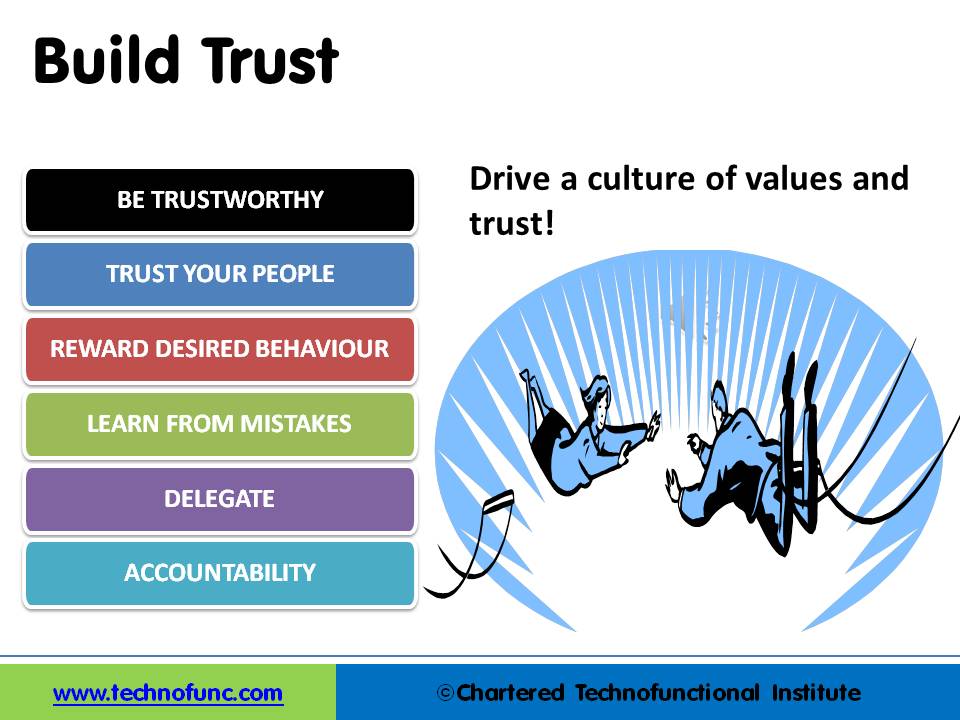- Home
- Business Processes
- Industry Knowledge
- Aerospace Industry
- Automotive Industry
- Banking Domain
- BFSI Industry
- Consumer/ FMCG Industry
- Chemicals Industry
- Engineering & Construction
- Energy Industry
- Education Domain
- Finance Domain
- Hospitality Domain
- Healthcare Industry
- Insurance Domain
- Retail Industry
- Travel and Tourism Domain
- Telecom Industry
- Leadership Skills
- eLearning
- Home
- Leadership Skills
- Project Leadership
- Team Development by Building Trust
Team Development by Building Trust
As your team begins to work together, you need to establish a way each team member can exchange ideas and build mutual trust. Successful groups are built on trust and collaboration. A free exchange of ideas, in an open environment, will allow your team to get to know each other and enable you to check on how they work together. Learn some tips to help build team trust and establish personal bonds.
Setting up a series of informal meetings, early on in your project, offers an ideal opportunity for team member exploration. Like other teams, your people will also most likely progress through several predictable stages of team formation and help them bond with each other, as they move from being strangers to form a cohesive team. Use this time to discuss your project, delegate particular tasks, set individual roles, and discuss objectives. Always make sure that everyone involved understands every stage of their involvement.
Use the following six-step approach to cultivate an environment of trust within your team:
1. Trust Your People
Employees will never work to their full potential if they don't feel trusted by management. Trust the intentions of your people to do the right thing. Employees who do feel trusted are higher performers and exert extra effort, going above and beyond role expectations. Trust they want to make the right decision, and make choices that, to the best of their understanding are the best and, still might work. Trusted employees feel more valued, which will help to make them feel more engaged in their work.
2. Reward Desired Behavior
Reward desired behavior by letting your team know that they will be rewarded for a job well done and supported if they run into difficulties. Make sure your team feels valued. Interact frequently and give yourself opportunities to let your team know a job is being done well. Or they will be supported and guided to do the course correct if necessary. With positive reinforcement, you add a positive reward when a person is showing desired behavior. As a team member ensure to be trustworthy and establish your credibility. Be reliable. Always try to accomplish what you say, do it on time, and without any excuses.
3. Learn from Mistakes
Generally, we all start our careers being a member of a work team, and gradually may find ourselves in a team leader role, at some point in our career. Learn from mistakes and let people learn from their mistakes. Establish a culture where people who take action and make a mistake will be viewed positively in your empowered organization. Punished learners do not learn the new skill; instead, they learn to avoid the person who punished them by taking fewer risks. Mistakes help people learn to become empowered

4. Empower & Delegate:
Most of the organizations today we work for have certainly changed from the previous traditional ways of working (such as hierarchical based organizations or functionally driven organizations) to matrix-based organizations where the relevance of team-based approaches have gained even more importance. The biggest challenge that leaders face while working with such structures is, how do they as team leaders ensure the empowerment of employees and start sharing their leadership responsibilities with the team members to maximize creativity and productivity. Delegation and trusting someone to do a job are also empowered. Demonstrate trust in others so there is a foundation for them to trust you. Always remember trust goes both ways.
5. Establish Accountability:
Once you have empowered people hold others accountable and set the expectations as early as possible. Demonstrate accountability in all your actions. Remember there is no true glory without accountability. Take the opportunity to clarify the behaviors expected of each team member. Use your Team Charter to build an understanding of team objectives. Each person should clearly understand the goals of the group and should know how these fit with your organization's overall objectives. Establish Key Performance Indicators (KPIs) linking your team's tasks to your organization's goal and objectives and use these indicators to start managing performance. Team members should be clear about the definitions of these KPIs and must understand how they affect them directly so that they understand their deliverables and how they will be measured. Provide all the needed materials and equipment to do the job effectively.
6. Provide Timely Feedback:
One of the most important roles that you have as a team manager is that of keeping individuals motivated and energized to keep working for organizational goals. Regular feedback helps employees efficiently direct their attention and energies, helps them avoid major errors and dead ends, and keeps them from learning things they later will have to unlearn at great cost. Try to tailor your efforts based on the different needs of each individual (refer to the Situational Leadership Model). Building effective teams is a continuous process – keep revisiting each step of this process on a regular basis.
Related Links
You May Also Like
-
Understanding Corporate Strategy
Management outlook and procedures have been revolutionized by more and more innovations over the recent years. It is no longer possible to follow traditional approaches to develop your organization's direction, its management as well its effectiveness. Senior managers need to be good decision-makers. In this section, we introduce concepts for strategy, strategic planning, strategic leadership, their exact meaning and associated terms, and how to use them.
-
In our present Hitech scenario, society is changing very fast. What are the skills that are most relevant for leaders in relation to the changing economic environment? Leaders need to develop skills to drive innovation and change in order to play a more central role in their organizations’ activities. How do managers accept the change and meet business expectations by becoming a key figure in driving change and innovation?
-
In today's business world, proficiency in management skills is essential for career growth and success. Managerial skills can be defined as attributes or abilities that are essential for every leader and manager to succeed and fulfill specific tasks expected from them by the organization.
-
The best career choices are ones that match your values. Each person has several values that are important to him. These values are highly personal and knowing them provides a clearer sense of what's most important to you in your life and career. Career values are the beliefs you consider important from a work standpoint. Values help you understand what you want from a job? Explore a few examples of work values that can influence career path and job satisfaction.
-
“Level 5 Leadership”, this term was coined by Jim Collins in his book “Good to Great” and it is all about achieving "Greatness" as a leader. This article will explain what we mean by Level 5 Leadership and what the characteristics of a Level 5 leader are. What it takes to achieve greatness as a leader, and what are the steps and strategies that one can use to move up to this top level of leadership.
-
Emergent leadership occurs when a group member is not appointed or elected as leader, but rather that person steps up as the leader over time within-group interactions. Have you ever faced challenges in getting accepted into your new role of position as a leader? Groups don't automatically accept a new "boss" as a leader. Emergent leadership is what you must do when taking over a new group. Learn more about emergent leadership.
-
Time management is the process of planning and exercising conscious control of time spent on specific activities, especially to increase effectiveness, efficiency, and productivity. The best time management techniques improve the ways you work. Time management refers to managing time effectively so that the right time is allocated to the right activity. Learn more about the five steps for effective time management viz. study, identify, analyze, decide, and implement.
-
Robert Katz identified three leadership skills called - technical skills, human skills, and conceptual skills as the basic personal skills essential for leadership. Leaders must possess these three skills that assist them in optimizing a leader's performance. Technical skills are related to the field, human skills are related to communicating with people and conceptual skills related to setting the vision.
-
Reasons behind Wastage of Time
Under-utilization of time may be due to the faulty system or faults of manager/officer/leader or due to lack of planning. There could be many factors driving the procrastination behavior like system issues, personal work habits, and lack of delegation, personality traits, and bad working habits of the leader, failure to tackle interpersonal conflicts, obstacles, and lack of far-sightedness.
-
Team Development by Building Trust
As your team begins to work together, you need to establish a way each team member can exchange ideas and build mutual trust. Successful groups are built on trust and collaboration. A free exchange of ideas, in an open environment, will allow your team to get to know each other and enable you to check on how they work together. Learn some tips to help build team trust and establish personal bonds.
Explore Our Free Training Articles or
Sign Up to Start With Our eLearning Courses

About Us
Learning
© 2023 TechnoFunc, All Rights Reserved










